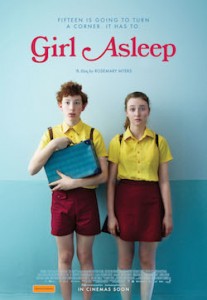film review: girl asleep
Girl Asleep is a colourful and creative film about leaving childhood behind. Set in 1970s suburban Australia, the film is a visual delight, and a clever representation of the confusing and somewhat terrifying experience of being a teenager.
14-year-old Greta Driscoll (Bethany Whitmore) has just moved house and started a new school. She meets Elliott (Harrison Feldman), a talkative boy who is very keen to be her friend, and decides to avoid the intimidating Denise (Danielle Catanzariti) and her followers Saph and Amber (played by Fiona and Grace Dawson respectively).
Meanwhile, Greta’s mother Janet (Amber McMahon) and father Conrad (Matthew Whittet) are fighting, both with each other and with their eldest daughter Genevieve (Imogen Archer). In the midst of all of this, Greta is trying to find her place. Much of the film’s action takes place at her fifteenth birthday party, which Janet insists on throwing after she decides her youngest daughter needs a little extra push to come out of her shell.
Dressed in a pink polka dot dress picked out for her by Janet, Greta is anything but excited for the party. The guests roll in, and Denise, Saph and Amber stop by to humiliate the birthday girl. After a confusing encounter with Elliot, the film takes a surprising and intriguing turn: Greta enters an alternate world of her own imagination, where her parents become mythical characters and she is constantly hunted, but also has someone watching out for her – the brilliant Huldra (Tilda Cobham-Hervey).
It quickly becomes clear that this universe is a version of Greta’s own, where the perils of growing up are made fantastical. Her encounters with her parents, reimagined as ‘abject man’ and ‘frozen woman’, reflect her changing relationships to them in the real world and their own struggles with the changes life brings. Meanwhile, Genevieve’s boyfriend Adam (Eamon Farren) becomes fictional French musician Benoit Tremet, who makes an unwanted move on Greta in the alternate version of her bedroom.
Greta is upset by what she encounters in this world, and it is only when she comes face to face with her childhood self that she begins to make peace with moving on. The transition from child to young adult has been explored in so many films and stories, yet this film stands on its own because of its distinctive approach to representing that transition. In fact, its message becomes all the more powerful because its presentation is so fresh.
As well as letting go of the familiar and wonderful parts of her childhood, Greta must deal with what it means to become a young woman in particular. She has to contend with attention from males her own age and older, which is not always wanted, and her parents’ expectations of what a young woman should be (someone who wears a pink polka dot dress, for example). Thankfully, she has female role models to guide her – both in her imagination, with the mysterious but wise Huldra, and in her real life, with her sister Genevieve.
Along with its interesting themes, the film has lots to offer in the nostalgia department. Little touches like Greta’s green Tupperware lunchbox and her backyard totem-tennis pole bring memory-stirring authenticity, and the family home’s décor is the perfect representation of retro suburbia. Camera angles and narrative signposts are used cleverly, and the costumes in the alternate world have a distinct D.I.Y feel – these features make the film more personal, and ensure it has its own unique aesthetic.
That the film makes such clever use of its medium is interesting, because it has been adapted from a stage production by South Australian company Windmill Theatre. It is also the debut feature film from director Rosemary Myers, Artistic Director of Windmill. Her quirky style shows lots of promise, and such a view was obviously shared by the CinefestOZ jury, who recently awarded the film a $100,000 prize. Myers told Film Ink that they would be using a good chunk of the money for publicity, so perhaps the film will continue to receive the attention it deserves.
Girl Asleep is a unique exploration of universal themes. It is short and sweet and has a distinctly Australian tone, and the fact that it comes from a first-time female director is just one more reason to see and support this independent film.


